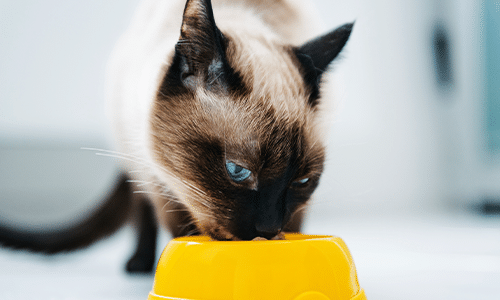
There are indeed a lot of reasons why your Siamese’s appetite increased suddenly. It might be as simple as the colder weather requiring more food to feed their system and regulate their temperature. Pregnancy, switching to a lower-quality diet, certain drugs, or even an increase in activity can all produce a natural rise in hunger.
You’re not the only one who feels this way. As a cat guardian, you know that a cat who refuses to eat for more than a day requires a trip to the veterinarian. But did you know that a cat who is always hungry can be an indication of physical and mental health issues? Here are several answers to the issue, “Reasons Your Siamese Cat Is Always Hungry”.
Is your cat always hungry? Roundworms can cause a cat to be constantly hungry because the worms consume all of the nutrition in his food before he can consume it. A roundworm-infested cat may look fat, as the parasites cause his body to swell.
Roundworms are contagious to humans, so bring a bacterial sample to your vet to be checked if you suspect your cat has them.
Hyperthyroidism causes an increase in appetite because your cat’s metabolism burns too many calories, and diabetes causes an increase in appetite because your cat’s body can’t convert sugar to energy — and the nutrients don’t even get into his body in the first place. Get your cat to the vet as soon as possible if he’s constantly hungry, eating frequently but still losing weight, and especially if he’s drinking a lot of water.
Cats, like humans, can acquire diabetes mellitus, a condition in which they are unable to control their blood sugar levels. Diabetes mellitus is diagnosed by a blood test, and the four basic indications are a ravenous appetite, weight loss, increased urine, and increased water consumption. Diabetes will shorten your cat’s lifespan if left untreated, and it can cause poor skin and hair, liver problems, and secondary bacterial infections. It can also lead to a potentially fatal condition called ketoacidosis, which can cause collapse, seizures, or a coma, or diabetic neuropathy, which causes your cat’s hind legs to become weaker over time.
Siamese cats are high-energetic cats, clever cats who require a lot of mental and physical stimulation. If those demands aren’t addressed, your cat may turn to eat, particularly if you leave food available all day so he may eat whenever he wants.
To keep his focus off his food, make sure he has other intellectually interesting toys (or maybe a feline pal). You can also purchase automatic feeders, which allow access to a certain amount of food at predetermined times throughout the day.
Overeating can be a self-soothing activity for cats who are depressed or grieving, just as it is for humans. If your cat is depressed, use soft interactive play to help him come out of his shell. Give him “love blinks” by slowly closing your eyes, leaving them closed for a second, and then slowly opening them while thinking “I love you.”
Do you know how after eating fast food, no matter how much you ate, you’re usually hungry an hour later? Another surprising answer to the question, “Why is my cat always hungry?” is that low-quality cat food can have the same effect. When the cat’s food is not meeting his nutritional needs, your cat will try to eat more food to fulfill his nutrition. So try to change the food of your cat and give your cat a nutritious diet.
IBD is a series of chronic gastrointestinal illnesses caused by an infiltration of inflammatory cells into the walls of your cat’s gastrointestinal tract. It is more common in older cats. The cells thicken the lining of their gastrointestinal tract, making it difficult for your cat’s intestines to work normally. Once your cat has been diagnosed with IBD, your veterinarian may recommend a particular diet or medicine to treat IBD.
Any persistent change in appetite should be addressed by a visit to your veterinarian for a check-up; they will be able to give them a complete examination and, if a health problem is found, will advise you on how to best treat it.
If a new cat has moved into the neighborhood (or if you’ve brought home a new kitten or puppy), you may find that their hunger hasn’t increased at all – they’re simply not getting the food you’re serving. If you feel this is the case, store their food in a more safe place, such as up high and indoors.
Your cat’s behavior could be a symptom of more serious medical issues, such as the ones listed above. If your cat appears to be depressed, the best thing you can do is take her to the veterinarian. Cats generally don’t eat just to eat. Their stomachs aren’t big enough to comfortably hold a lot of food. If your cat is constantly hungry, the best course of action is to contact your veterinarian, explain the situation, and come up with a plan of action.